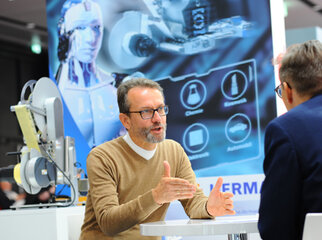Question: Packaging Valley has recently been able to attract many new companies. How would you explain this growing interest?
Martin Buchwitz: One reason would certainly be the merger with PEC, the Packaging Excellence Center Region Stuttgart, which was completed in 2020. The catchier name, Packaging Valley, was retained. This simply made Packaging Valley more powerful and gave it more weight, which automatically attracts other interested parties. It must also be pointed out, however, that Packaging Valley had been rather reserved in the past, especially in the area of social media – we’ve changed that now.
So there has been a change of heart in this respect as well?
I myself have over 15 years of marketing experience on the corporate side, including many years in a management position with an automation specialist. After joining Packaging Valley in 2019, it was clear to me that something needed to be done in the communications area, for example in social media, but also through new formats such as a podcast. This is now paying off. We now have over 100 members, although we’re not even actively canvassing, and membership growth is not a goal in itself for Packaging Valley. We want to continue to concentrate on Germany’s southern regions, and we believe that quality goes before quantity. Equally important to us is a strong focus on packaging machine construction and the corresponding automation technology.
Packaging Valley made an eye-catching appearance at Fachpack. Was that also a part of this communications campaign?
Everything we do should and must serve and benefit our members. The Packaging Valley joint stand at Fachpack was clearly recognizable as such, but the focus was clearly on the individual companies, their product portfolios and their messages. The visitors showed up primarily because they were looking for technical solutions and were able to quickly find contacts at our stand for very different aspects of their individual problems. And that’s how it should be, but of course we were also pleased that some visitors found out about the work that Packaging Valley does.
In your view, how important is it that HERMA is the first labeling technology to enter Packaging Valley?
We've previously had one or two companies on board before where labeling technology plays a role, but HERMA is the first to actually focus on this topic to this extent, so HERMA joining us does contribute a significantly different quality. For Packaging Valley, it’s becoming increasingly important to look at the entire packaging technology value chain. HERMA – and the area of labeling technology as a whole – is an important component in this.
The drive towards more sustainability is clearly the order of the day. What role does this aspect play for Packaging Valley’s members?
In recent years, it has become increasingly clear that our members are acting or want to act in a sustainable way out of their own inner convictions, not because the topic happens to be trending at the moment. This is perhaps partly due to the fact that many of our members are still family-owned companies and are firmly rooted in their region. This is actually true for HERMA as well. These companies have a sense of responsibility for their home regions. They’re also aware that people look up to them and perhaps expect them to be role models or pioneers.
How does Packaging Valley support its members in this area?
We’ve started our own sustainability working group where we look at this subject in all its different aspects. On the one hand, it’s about the companies themselves, their supply chain, their energy supply, but of course also the behavior of their own employees. The second aspect is the actual packaging machine. For example, there’s the question of their energy efficiency, but also the processes and materials used for their production. The third aspect is the packaging itself, in particular the packaging material to be processed. In this respect, packaging machinery manufacturing is a key industry. The manufacturers of packaging materials have many good ideas and solutions, especially when it comes to sustainability, but at the end of the day, it has to be processed on the packaging machine. For all three of these aspects, the exchange between members is crucial and highly beneficial, especially for small and medium-sized enterprises.
What would you say are the strengths of Germany’s packaging specialists? How can domestic companies continue to hold their own in an increasingly competitive international environment?
Packaging machines are usually special purpose machines. You can't buy systems like that off the shelf. To manufacture these systems, you need not just the technology, but also decades of experience in tailoring such solutions. Germany’s mechanical engineering sector in particular also benefits from an exceptionally high level of trust and confidence on the customers’ side, and that trust is well-earned – and it was earned the hard way, ranging from the materials and components used to complete project management to reliable service over many years. In the packaging sector, every minute of downtime costs real money. Customers don't just want to buy a machine, they want safe and efficient processes, often around the clock, and not just in particularly critical industries such as pharmaceuticals and food. The entire package works as a whole. And let’s not forget that when it comes to automation, German companies are in first place worldwide. We have the most innovative, highest-quality mechanical engineering and at the same time, in our own country and in Packaging Valley, the automation partners that are absolutely necessary. This close interaction plays a very important role. Maintaining and perhaps even expanding this competitive edge is an important goal for Packaging Valley. I am very optimistic about this, and the members are cognisant of the challenge, but also quietly confident at the same time.
